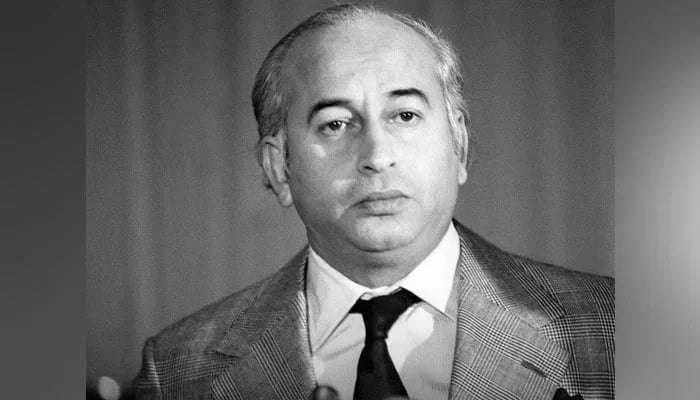Recognising our leaders
Bhutto's life was marked by both towering achievements and tragic injustices
In a long-overdue moment, President Asif Ali Zardari conferred the Nishan-e-Pakistan (posthumous) upon the late Zulfikar Ali Bhutto in recognition of his contributions to public service. For many, this award is a well-deserved acknowledgement of Bhutto's immense contributions to Pakistan -- from giving the country its first consensus-based constitution in 1973 to his commitment to democracy and the people. Bhutto's life was marked by both towering achievements and tragic injustices. Overthrown by a military dictator, he was subjected to a politically motivated trial and eventually hanged in 1979. His judicial murder has remained a stain on Pakistan's legal history. The recent admission by Chief Justice Qazi Faez Isa that Bhutto did not receive a fair trial is an important step towards justice and the Supreme Court's acknowledgement that "fair trial and due process requirements were not met" provides some sense of closure. In this context, the Nishan-e-Pakistan award serves as a recognition of his contributions as well as a symbolic attempt to right historical wrongs.
Despite the significance of this recognition, there has been criticism from some quarters. However, acknowledging political leaders for their contributions should be an evolving tradition. Today, it is Bhutto; tomorrow, it could be Wali Khan, Benazir Bhutto, Akhtar Mengal, Nawaz Sharif, Asif Zardari, Imran Khan, or any other political leader who has played a role in shaping Pakistan. Political leaders have historically paid a heavy price in this country, facing persecution, imprisonment, and even assassination at the hands of unelected interventionists. They are demonised, but their contributions remain undeniable and some would argue that it is because of Pakistan’s politicians that the federation remains intact. The 1973 constitution was a product of political consensus, uniting diverse and often opposing political forces. The 18th Amendment, which empowered provinces and granted them autonomy, was also achieved through political consensus. When the country faced terrorism, political parties stood together to combat it. Now, as Balochistan continues to burn, another political consensus is needed.
History has shown that even when politicians are vilified during their lifetime, their legacies endure. Bhutto’s posthumous recognition is a testament to this fact. It is time Pakistan as a nation stopped persecuting its leaders and started acknowledging their sacrifices. Our political leaders must also rise above personal rivalries and put the people’s interests first. If we truly want to move forward, we must honour those who have given their lives and service to Pakistan, rather than systematically erasing their contributions. This award to Bhutto is a step in the right direction -- but it must not be the last.
-
 Garrett Morris Raves About His '2 Broke Girls' Co-star Jennifer Coolidge
Garrett Morris Raves About His '2 Broke Girls' Co-star Jennifer Coolidge -
 Winter Olympics 2026: When & Where To Watch The Iconic Ice Dance ?
Winter Olympics 2026: When & Where To Watch The Iconic Ice Dance ? -
 Melissa Joan Hart Reflects On Social Challenges As A Child Actor
Melissa Joan Hart Reflects On Social Challenges As A Child Actor -
 'Gossip Girl' Star Reveals Why She'll Never Return To Acting
'Gossip Girl' Star Reveals Why She'll Never Return To Acting -
 Chicago Child, 8, Dead After 'months Of Abuse, Starvation', Two Arrested
Chicago Child, 8, Dead After 'months Of Abuse, Starvation', Two Arrested -
 Travis Kelce's True Feelings About Taylor Swift's Pal Ryan Reynolds Revealed
Travis Kelce's True Feelings About Taylor Swift's Pal Ryan Reynolds Revealed -
 Michael Keaton Recalls Working With Catherine O'Hara In 'Beetlejuice'
Michael Keaton Recalls Working With Catherine O'Hara In 'Beetlejuice' -
 King Charles, Princess Anne, Prince Edward Still Shield Andrew From Police
King Charles, Princess Anne, Prince Edward Still Shield Andrew From Police -
 Anthropic Targets OpenAI Ads With New Claude Homepage Messaging
Anthropic Targets OpenAI Ads With New Claude Homepage Messaging -
 US Set To Block Chinese Software From Smart And Connected Cars
US Set To Block Chinese Software From Smart And Connected Cars -
 Carmen Electra Says THIS Taught Her Romance
Carmen Electra Says THIS Taught Her Romance -
 Leonardo DiCaprio's Co-star Reflects On His Viral Moment At Golden Globes
Leonardo DiCaprio's Co-star Reflects On His Viral Moment At Golden Globes -
 SpaceX Pivots From Mars Plans To Prioritize 2027 Moon Landing
SpaceX Pivots From Mars Plans To Prioritize 2027 Moon Landing -
 King Charles Still Cares About Meghan Markle
King Charles Still Cares About Meghan Markle -
 J. Cole Brings Back Old-school CD Sales For 'The Fall-Off' Release
J. Cole Brings Back Old-school CD Sales For 'The Fall-Off' Release -
 GTA 6 Built By Hand, Street By Street, Rockstar Confirms Ahead Of Launch
GTA 6 Built By Hand, Street By Street, Rockstar Confirms Ahead Of Launch




